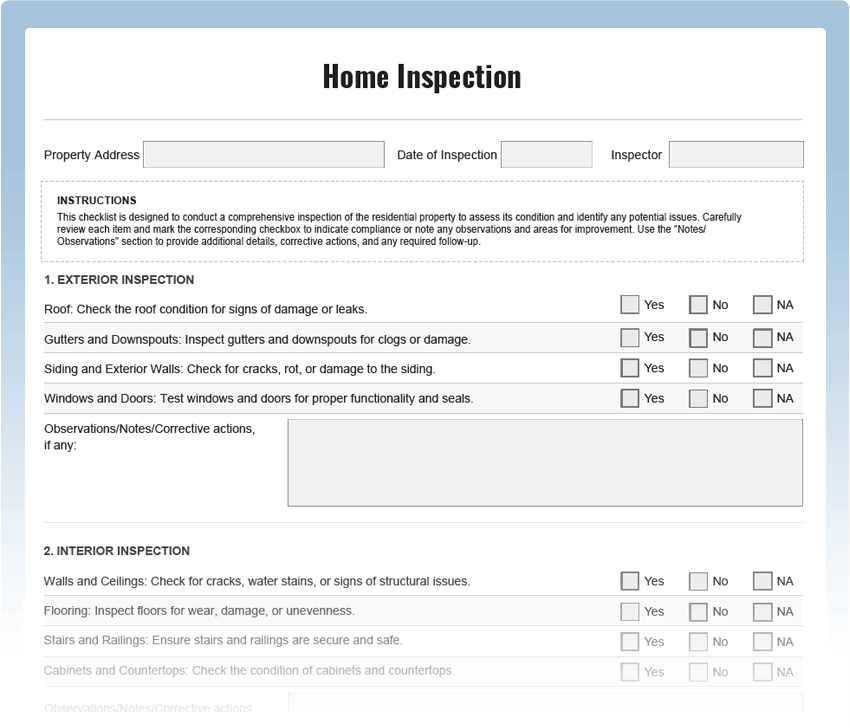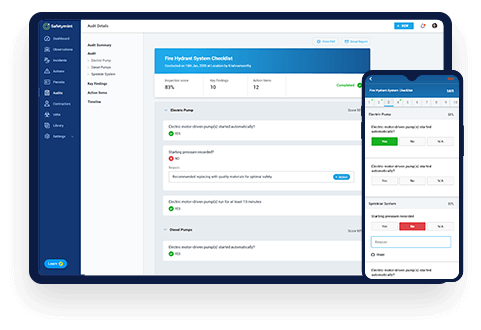Home Inspection Checklist
Ensure the safety, functionality, and peace of mind of your home with our comprehensive Home Inspection Checklist. This free PDF template covers all essential aspects of inspecting a residential property, enabling you to identify potential issues, plan for maintenance, and make informed decisions when buying or selling a home.

Digitize this Checklist on Safetymint
- Create unlimited, customized checklists
- Add Actions, with automated reminders
- Works seamlessly with or without internet
- Access via web browsers, mobile or tablets

What is a Home Inspection Checklist?
A Home Inspection Checklist is a systematic tool used to evaluate the condition and safety of a residential property. It includes a series of checkpoints designed to inspect various areas of the home, from the foundation to the roof. A thorough home inspection provides valuable insights into the property’s overall condition, allowing homeowners and buyers to address any concerns and prioritize maintenance or repairs.
Key Areas to Inspect in a Home:
- Exterior and Roof: Check the exterior walls, roof, gutters, and downspouts for damage, leaks, or signs of wear.
- Foundation and Structure: Inspect the foundation for cracks or settling issues and assess the overall structural integrity.
- Electrical System: Test electrical outlets, switches, and the circuit breaker panel for functionality and safety.
- Plumbing System: Check for leaks, water pressure, and functionality of faucets, toilets, and drains.
- Heating, Ventilation, and Air Conditioning (HVAC): Inspect the HVAC system for proper operation and maintenance.
- Interior Spaces: Assess the condition of walls, ceilings, flooring, and windows.
- Kitchen and Appliances: Verify the functionality of kitchen appliances and inspect cabinets and countertops.
- Bathrooms: Check for leaks, ventilation, and functionality of bathroom fixtures.
Common Home Inspection Findings:
Frequent issues found during home inspections include:
- Roof Damage: Missing or damaged roof shingles, leading to potential leaks.
- Foundation Cracks: Cracks in the foundation indicating settling or structural issues.
- Electrical Hazards: Unsafe electrical wiring or overloaded circuits.
- Plumbing Leaks: Leaking pipes or fixtures causing water damage.
- HVAC Problems: Inefficient or malfunctioning heating and cooling systems.
- Professional Inspection: Consider hiring a qualified home inspector to conduct a comprehensive inspection.
- Maintenance History: Gather information about the home’s maintenance and repair history.
- Prioritize Safety: Address safety concerns and potential hazards promptly.
- Documentation: Keep detailed records of the inspection findings and any recommended repairs.
Safetymint for your Home Inspection:
Streamline your home inspections with Safetymint, our advanced safety inspection software. Safetymint simplifies the inspection process, making it easy to conduct and document home assessments efficiently. Our cloud-based platform ensures data security and stability, making it the ideal solution for all your inspection needs. Try Safetymint free for 14 days and gain confidence in your home investment.

Disclaimer:
The Home Inspection Checklist provided by Safetymint is intended for general informational purposes only. Every home is unique, and specific inspection requirements may vary based on individual property characteristics and regulations. Users of this template are encouraged to review and customize the checklist to align with their specific home type, age, and maintenance history.




